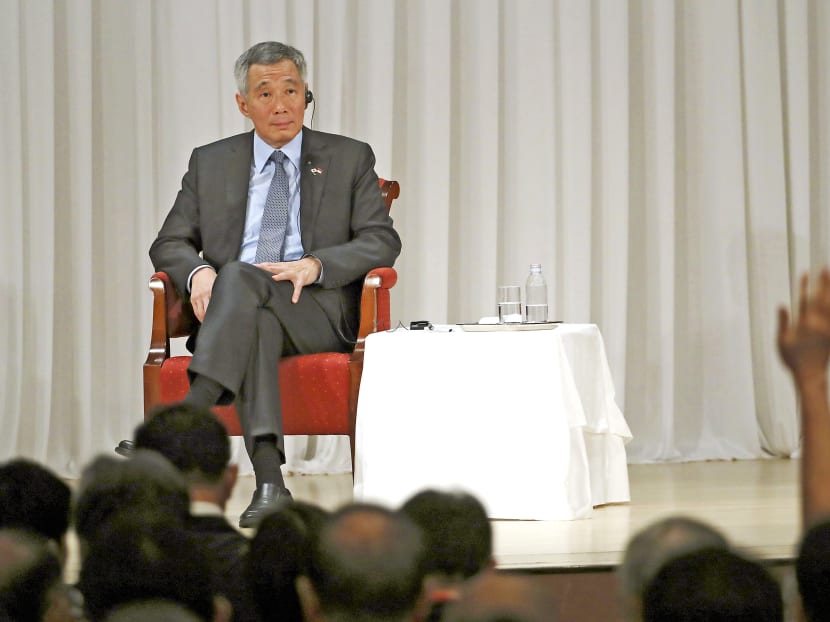Singapore must stick to one stance in foreign policy: PM Lee
TOKYO — When it comes to foreign policy, Singapore must be seen to have its own position — one that is stuck to no matter who or which nation the Republic is dealing with, Prime Minister Lee Hsien Loong said on Thursday (Sept 29).

Prime Minister Lee Hsien Loong at a dialogue session at the Nikkei International Conference on the Future of Asia on Thursday. Mr Lee stressed that Singapore’s basic approach is to be friends with all countries that are ‘willing to be friends with us’. PHOTO: MCI
TOKYO — When it comes to foreign policy, Singapore must be seen to have its own position — one that is stuck to no matter who or which nation the Republic is dealing with, Prime Minister Lee Hsien Loong said on Thursday (Sept 29).
Adding that the Republic cannot be seen to be playing sides, Mr Lee stressed that Singapore’s basic approach is to be friends with all countries that are “willing to be friends with us”. This is easier when “they are also friends with one another”, he noted.
“But from time to time there will be issues between our friends, and we will have to decide where we are going to stand, and try our best to preserve our friendship with both sides of the issue. The South China Sea is one of those examples,” said Mr Lee in an interview with the Singapore media wrapping up his four-day official visit to Japan.
Mr Lee’s remarks come on the back of a public exchange of words between the Chinese state-owned Global Times tabloid and Singapore’s Ministry of Foreign Affairs. The newspaper claimed that the Republic had tried to push for a stronger statement on an international tribunal’s ruling on the South China Sea at the Non-Aligned Movement (NAM) summit last week in Venezuela.
This sparked a pushback from Singapore’s ambassador to China Stanley Loh, who said the claim was fabricated, false and unfounded. But the Global Times maintained its sources were credible, and said Mr Loh should urge Singapore to “conduct self-reflection” instead. In response, Mr Loh stated that the crux of the matter is that Global Times’ Sept 21 report did not accurately reflect the proceedings at the recent NAM Summit, which can be verified by the public record of the meeting.
Commenting on the issue, Chinese Foreign Affairs Ministry spokesman Geng Shuang said on Tuesday that NAM was not the proper forum to discuss the South China Sea issue. Asked if China-Singapore ties will be affected by the episode, he said: “China and Singapore established the All-Round Cooperative Partnership Progressing with the Times last year. I want to stress that on issues concerning the core interests and major concerns of the two sides, China and Singapore should understand and respect each other.”
During the interview with the Singapore media, Mr Lee was asked whether he was concerned that Singapore is being pushed to take sides in regional disputes and the repercussions of being seen to do so.
He said: “We must never be seen to be playing multiple sides. We must have a stand, our own position, and we stick to that position whomever we are talking to.”
He added: “You cannot have different messages for different people because you will soon run into very serious trouble.”
On the South China Sea territorial disputes, Singapore states its position whenever possible. “When we can help to push things forward with the other countries, we work with them to do that. Where the countries don’t agree, we just accept that there are different perspectives – ‘I am not exactly the same as your position, but that doesn’t mean I am against you’,” said Mr Lee.
He also stressed that “no single issue defines a relationship with another country”. “A relationship is always multi-faceted, you’ve got trade, you’ve got people-to-people relations, you’ve got education cooperation, you’ve got tourism. It’s an overall relationship and you have to try and contain the issues where there may be difficulties, and not let it sour the gamut of ties,” he said.
He added: “They want to hear our views, we have a point of view, and I think it’s worth our while to state it, and well, we offer it for consideration. It’s not the last word but we hope there’s something there that can stimulate their thought.”
During a joint press conference on Wednesday by Mr Lee and Japan Prime Minister Shinzo Abe, both leaders also spoke about China’s terrorial disputes with other countries, among other topics such as North Korea and the Trans-Pacific Partnership - prompting Global Times to headline its report on the press conference as “Singapore stirs South China Sea situation again”.
Before speaking to the Singapore media on Thursday, Mr Lee delivered a speech at the Nikkei International Conference on The Future of Asia. In his address, Mr Lee spoke at length on Japan-China ties, as well as China’s increasing stature and the “natural unease and apprehension that its rapid rise elicits in its neighbours and other powers”.
On his choice of topics, Mr Lee said: “Well because I’m here in Japan and they asked me to speak about international, Asian issues, and I can’t speak about Asian issues without speaking about Japan and about China.”






